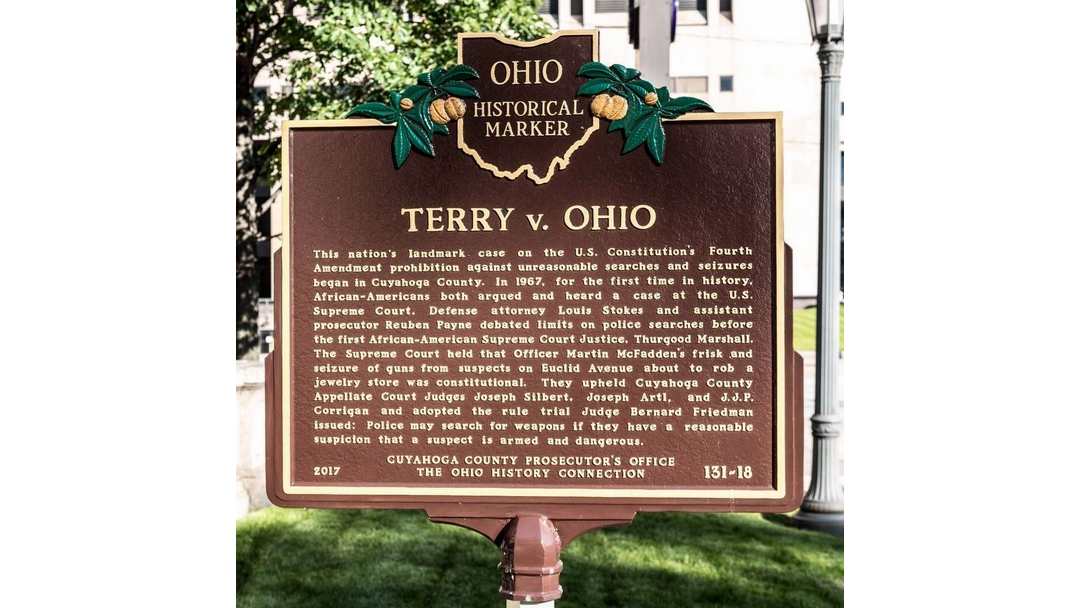Terry v. Ohio (1968)
Background
On October 31, 1963 while conducting his regular patrol in downtown Cleveland, seasoned Cleveland Police detective Martin McFadden, who brought 39 years of law enforcement experience to the job, observed three men behaving suspiciously as they paced back and forth in front of a jewelry store located on Euclid Avenue.
Concerned that the men were planning a robbery and possibly armed, McFadden identified himself as a police officer and inquired about their names. When the men merely mumbled their responses, McFadden conducted a frisk, discovering a pistol in John W. Terry’s overcoat pocket and a revolver in Richard Chilton’s coat pocket.
The unarmed third man, Katz, was noted in the incident where McFadden apprehended and charged Terry and Chilton for carrying concealed weapons. Judge Bernard Friedman of the Cuyahoga County Common Pleas Court subsequently found the defendants guilty, deeming that the suspicious behavior displayed by the men, coupled with McFadden’s genuine concern for his safety, justified the decision to conduct a frisk. This ruling was later upheld by the appeals court. In 1967, Terry brought the case before the U.S. Supreme Court.
In June 1968, the United States Supreme Court affirmed the conviction and set a precedent that allows police officers to interrogate and frisk suspicious individuals without probable cause for an arrest, providing that the officer can articulate a reasonable basis for the stop and frisk.
Significantly, Terry does not provide blanket authority to intrude on an individual’s right to be left alone, nor does it allow such intrusion based on a police offers inarticulate hunch that a crime is about to occur or is in progress.
However, it does radically expand police authority to investigate crimes where there is a reasonable basis for suspicion.
More in depth case detail can also be read here
Legal Counsel and Your Rights
When facing legal challenges, particularly in criminal cases, it is advisable to seek legal counsel immediately.
An experienced attorney can provide guidance on how to navigate interactions with law enforcement while safeguarding your constitutional rights.
Since 1993 our expert legal defense in navigating criminal law matters and protecting your constitutional rights are what we eat for breakfast everyday.
Contact Komorn Law PLLC if you’re ready to fight and win.
Research us and then call us.
Recent

Michigan lawmakers want to revive “junk science” roadside drug testing
The Roadside Drug Test...AgainHouse bills 4390 and 4391The proposed House bills 4390 and 4391 would enable law enforcement to administer tests aimed at assessing driver impairment; however, these testing devices do not provide information regarding the level of...

Domestic Violence Conviction Prohibits Gun Ownership
No Second Amendment Rights For YouIf you are charged with a crime you're part of the State of Michigan family now. Call us - Because you don't want to be a part of that family. Komorn Law (248) 357-2550A federal judge in Michigan has ruled that a man with a prior...
Other Articles
SCOTUS Decision Gives Starbucks a Win in Labor Dispute
The decision underscored the principle that only activities that are essential and directly related to an employee's primary job responsibilities are subject to compensation. In a recent decision by the Supreme Court of the United States (SCOTUS), Starbucks received a...
The 6th Amendment – Do You Know What It Is?
The 6th Amendment: is it still a thing?The 6th Amendment to the United States Constitution is a crucial pillar of the Bill of Rights, designed to ensure fair and just legal proceedings for individuals accused of crimes. Ratified on December 15, 1791, this amendment...
The US Supreme Court and Federal Gun Law Cases
The US Supreme Court and Federal Gun Law CasesChallenges to Federal Gun Laws the right of the people to keep and bear Arms, shall not be infringed Updated July 8, 2024 Ratified in 1791, the Second Amendment provides, “A well regulated Militia, being necessary to the...
Do Passengers in a Vehicle have 4th Amendment Rights?
Do Passengers have 4th Amendment Rights?Michigan Supreme Court Limits Police Ability to Search Passenger Property in CarsBackground Mead was a passenger in a car and had just met the driver, who offered him a ride. When the police stopped the vehicle and ordered both...















